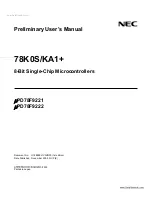
Rev. 1.40
78
De�e��e� 1�� �01�
Rev. 1.40
79
De�e��e� 1�� �01�
BS67F340/BS67F350/BS67F360/BS67F370
Enhanced Touch A/D Flash MCU with LCD Driver
BS67F340/BS67F350/BS67F360/BS67F370
Enhanced Touch A/D Flash MCU with LCD Driver
Oscillators
Various oscillator types offer the user a wide range of functions according to their various application
requirements. The flexible features of the oscillator functions ensure that the best optimisation can
be achieved in terms of speed and power saving. Oscillator selections and operation are selected
through a combination of application program and relevant control registers.
Oscillator Overview
In addition to being the source of the main system clock the oscillators also provide clock sources
for the Watchdog Timer and Time Base Interrupts. External oscillators requiring some external
components as well as fully integrated internal oscillators, requiring no external components, are
provided to form a wide range of both fast and slow system oscillators. All oscillator options are
selected through register programming. The higher frequency oscillators provide higher performance
but carry with it the disadvantage of higher power requirements, while the opposite is of course true
for the lower frequency oscillators. With the capability of dynamically switching between fast and
slow system clock, each device has the flexibility to optimize the performance/power ratio, a feature
especially important in power sensitive portable applications.
Type
Name
Frequency
Pins
External High Speed Crystal
HXT
400kHz~16MHz
OSC1/OSC2
Internal High Speed RC
HIRC
8/12/16MHz
—
Exte�nal Low Speed C�ystal
LXT
32.768kHz
XT1/XT2
Inte�nal Low Speed RC
LIRC
32kHz
—
Oscillator Types
System Clock Configurations
There are four methods of generating the system clock, two high speed oscillators for all devices
and two low speed oscillators. The high speed oscillator is the external crystal/ceramic oscillator,
HXT, and the internal 8/12/16MHz RC oscillator, HIRC. The two low speed oscillators are the
internal 32kHz RC oscillator, LIRC, and the external 32.768 kHz crystal oscillator, LXT. Selecting
whether the low or high speed oscillator is used as the system oscillator is implemented using the
CKS2~CKS0 bits in the SCC register and as the system clock can be dynamically selected.
The actual source clock used for the low speed oscillators is chosen via the FSS bit in the SCC
register while for the high speed oscillator the source clock is selected by the FHS bit in the SCC
register. The frequency of the slow speed or high speed system clock is determined using the
CKS2~CKS0 bits in the SCC register. Note that two oscillator selections must be made namely one
high speed and one low speed system oscillators. It is not possible to choose a no-oscillator selection
for either the high or low speed oscillator.
















































